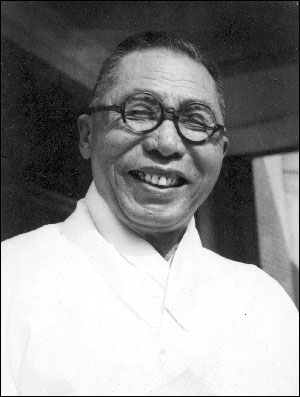Difference between revisions of "Kim Ku"
(desc) |
(some expand) |
||
| Line 2: | Line 2: | ||
|wikipedia=https://en.wikipedia.org/wiki/Kim_Koo | |wikipedia=https://en.wikipedia.org/wiki/Kim_Koo | ||
|spartacus= | |spartacus= | ||
| − | |image= | + | |image=Kim Gu in 1949.jpg |
| − | |birth_date=1876 | + | |birth_date=August 29, 1876 |
|birth_name=김구 | |birth_name=김구 | ||
|death_date=June 26, 1949 | |death_date=June 26, 1949 | ||
|constitutes=politician | |constitutes=politician | ||
| − | |description=An assassinated Korean politician | + | |victim_of=Counterintelligence Corps,assassination |
| − | + | |description=An assassinated Korean politician -possibly by the [[Counterintelligence Corps]] or their stooge [[Syngman Rhee]]. | |
|birth_place=Baegun-dong, Haeju, Hwanghae, Joseon Dynasty | |birth_place=Baegun-dong, Haeju, Hwanghae, Joseon Dynasty | ||
|death_place=Seoul, South Korea | |death_place=Seoul, South Korea | ||
| Line 23: | Line 23: | ||
}} | }} | ||
}} | }} | ||
| + | '''Kim Ku'''(Sometimes written as "'''Kim Koo'''" or "'''Kim Gu'''), also known by his [[art name]] '''Paekpŏm''', was a Korean politician. He was a leader of the [[Korean independence movement]] against the [[Empire of Japan]], head of the [[Provisional Government of the Republic of Korea|Korean Provisional Government]] for [[List of presidents of the Provisional Government of the Republic of Korea|multiple terms]], creator of the [[Korean Liberation Army]], and a [[Korean reunification]] activist after 1945. Kim is revered in South Korea, where he is widely considered one of the greatest figures in Korean history. | ||
| + | |||
| + | ==Assassination== | ||
| + | On June 26, 1949, while reading poetry in his office in the evening, Kim was assassinated by Lieutenant [[Ahn Doo-hee]], who burst in and shot him four times. | ||
| + | |||
| + | Ahn stated that he had killed Kim because he saw him as an agent of the Soviet Union.<ref>https://web.archive.org/web/20151222110341/http://www.koreatimes.co.kr/www/news/opinon/2015/11/165_30545.html</ref> According to [[Bruce Cumings]]'s 1981 book, another possible motive for the assassination was Kim Ku's alleged connection to the assassination of [[Song Jin-woo]], a leader of the Korean Democratic Party (KDP), who had chosen to work closely with the American military government.<ref>Cumings, Bruce (1981), [https://web.archive.org/web/20230623065402/https://books.google.com/books?id=fVrlzAEACAAJ&source=gbs_book_other_versions_r&cad=4 The Origins of the Korean War: Liberation and the emergence of separate regimes, 1945-1947] page 2019</ref> | ||
| + | |||
| + | On April 13, 1992, a confession by Ahn was published by [[The Dong-a Ilbo|''The'' ''Dong-a Ilbo'']]. In his confession, Ahn claimed that the assassination had been ordered by [[Kim Chang-ryong]], who served as the head of [[Syngman Rhee]]'s national security.<ref>Jager, Sheila Miyoshi (2013), ''[https://web.archive.org/web/20230531143001/https://books.google.com/books/about/Brothers_at_War_The_Unending_Conflict_in.html?id=dWUD-mi1dCcC Brothers at War – The Unending Conflict in Korea]'', London: Profile Books, pp. 48, 496, ISBN 978-1-84668-067-0, </reF> In 2001, declassified documents revealed that Ahn had been working for the [[Counterintelligence Corps|U.S Counter-Intelligence Corps]], leading to suggestions of American involvement in the assassination. However, some have questioned the evidence for those accusations.<ref>https://web.archive.org/web/20230623065405/https://www.pressian.com/pages/articles/65808</ref> | ||
{{SMWDocs}} | {{SMWDocs}} | ||
==References== | ==References== | ||
{{reflist}} | {{reflist}} | ||
{{Stub}} | {{Stub}} | ||
Revision as of 08:02, 6 December 2023
(politician) | ||||||||||
|---|---|---|---|---|---|---|---|---|---|---|
 | ||||||||||
| Born | 김구 August 29, 1876 Baegun-dong, Haeju, Hwanghae, Joseon Dynasty | |||||||||
| Died | June 26, 1949 (Age 72) Seoul, South Korea | |||||||||
| Nationality | Korean | |||||||||
| Victim of | • Counterintelligence Corps • assassination | |||||||||
| Party | Korean Independence Party | |||||||||
An assassinated Korean politician -possibly by the Counterintelligence Corps or their stooge Syngman Rhee.
| ||||||||||
Kim Ku(Sometimes written as "Kim Koo" or "Kim Gu), also known by his art name Paekpŏm, was a Korean politician. He was a leader of the Korean independence movement against the Empire of Japan, head of the Korean Provisional Government for multiple terms, creator of the Korean Liberation Army, and a Korean reunification activist after 1945. Kim is revered in South Korea, where he is widely considered one of the greatest figures in Korean history.
Assassination
On June 26, 1949, while reading poetry in his office in the evening, Kim was assassinated by Lieutenant Ahn Doo-hee, who burst in and shot him four times.
Ahn stated that he had killed Kim because he saw him as an agent of the Soviet Union.[1] According to Bruce Cumings's 1981 book, another possible motive for the assassination was Kim Ku's alleged connection to the assassination of Song Jin-woo, a leader of the Korean Democratic Party (KDP), who had chosen to work closely with the American military government.[2]
On April 13, 1992, a confession by Ahn was published by The Dong-a Ilbo. In his confession, Ahn claimed that the assassination had been ordered by Kim Chang-ryong, who served as the head of Syngman Rhee's national security.[3] In 2001, declassified documents revealed that Ahn had been working for the U.S Counter-Intelligence Corps, leading to suggestions of American involvement in the assassination. However, some have questioned the evidence for those accusations.[4]
References
- ↑ https://web.archive.org/web/20151222110341/http://www.koreatimes.co.kr/www/news/opinon/2015/11/165_30545.html
- ↑ Cumings, Bruce (1981), The Origins of the Korean War: Liberation and the emergence of separate regimes, 1945-1947 page 2019
- ↑ Jager, Sheila Miyoshi (2013), Brothers at War – The Unending Conflict in Korea, London: Profile Books, pp. 48, 496, ISBN 978-1-84668-067-0,
- ↑ https://web.archive.org/web/20230623065405/https://www.pressian.com/pages/articles/65808